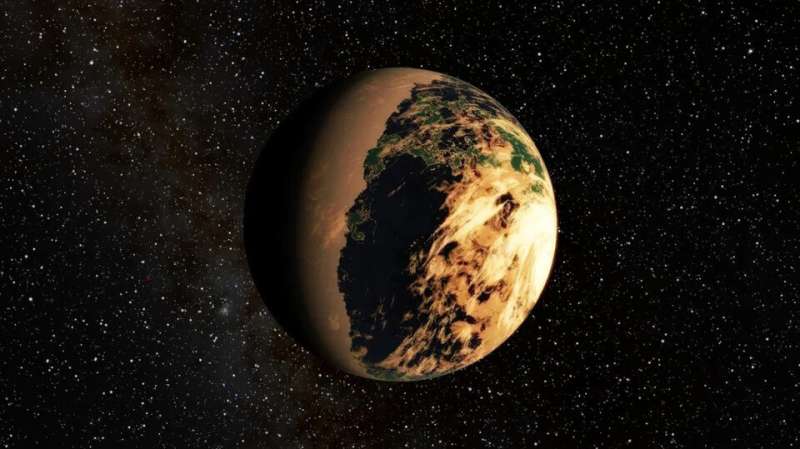This article has been reviewed according to Science X's editorial process and policies. Editors have highlighted the following attributes while ensuring the content's credibility:
fact-checked
peer-reviewed publication
trusted source
proofread
New paper investigates exoplanet climates

Inspired by the Milankovitch cycles that play a role in Earth's climate over time, new research at Florida Tech examines how these recurring orbital movements may affect the climate of exoplanets.
"Sporadic Spin-Orbit Variations in Compact Multi-planet Systems and their Influence on Exoplanet Climate," a study by Florida Tech exoplanetary scientist and astrobiologist Howard Chen and researchers at Georgia Tech, University of Toronto and NASA Goddard Space Flight Center, features new research that looks at the planetary spin associated with the Milankovitch cycle. Early findings have shown multi-planet systems that have planets close together influence each other's spin rate, and the spin rate can change dramatically throughout time.
Chen is modeling systems to study the seven planets in the TRAPPIST-1 system for this research.
This work could have major impacts on the study of exoplanets.
"This means that the star shines on a planet unequally at different times," Chen said. "It's not the constant or fixed or equal case anymore, which is what the usual assumption is for these 'tidally-locked' planets. Instead, it's distributed. The sunlight's distributed unevenly across the planet. And that has major implications for a subtype of a planet which are planets at the outer edge of the habitable zone."
Over millions of years, Earth's average climate has changed. From a geological perspective, this happens slowly because of the subtle yet steady influences on Earth's orbit, such as from the moon, other planets and the sun. As the orbit changes—thus causing the climate changes—precession (where the Earth's rotation axis is pointed), eccentricity (the shape of Earth's orbit) and inclination (the angle Earth's axis is tilted with respect to Earth's orbital plane) change, too. That's what the Milankovitch cycles address.
The orbital effect other planets can have on one another's rotation is even more dramatic for planets farther away from the host star due to the reduced strength of tidal dissipation. The study found that it is challenging to heat up planets at the outer edge due to greater degrees of substellar longitude migration and increased climate hysteresis. As this drift occurs on decadal timescales, it allows the formation of new sea-ice which increases the surface albedo of the planet, making subsequent deglaciation by stellar heating difficult.
Not all planetary systems will reflect this influence; certain characteristics are needed for planetary the spin rates to be affected by other planets, Chen said. The system must be a compact, multi-planet system (unlike our solar system) and must have planets of a certain size and mass, because less massive planets won't influence other planets' spin rates. For example, while Mars slightly affects Earth's spin, Jupiter has a bigger effect on Earth.
However, even with the caveats, what Chen has found is that planets on the outer edge of the habitable zone of compact multi-planet systems can have a very different climate than what previous research has found.
Based on their modeling, Chen also found that the spin could be a very different if more realistic interactions between the planets are included.
"What we can verify is the climate predictions, the surface chemistry of the planet," he said. "We can look at the thermal emission and then we can see the temperature and surface features of these planets. Is it what we found? If it is, then our model is correct."
The study is published in The Astrophysical Journal Letters.
More information: Howard Chen et al, Sporadic Spin-orbit Variations in Compact Multiplanet Systems and Their Influence on Exoplanet Climate, The Astrophysical Journal Letters (2023). DOI: 10.3847/2041-8213/acbd33
Journal information: Astrophysical Journal Letters
Provided by Florida Institute of Technology




















